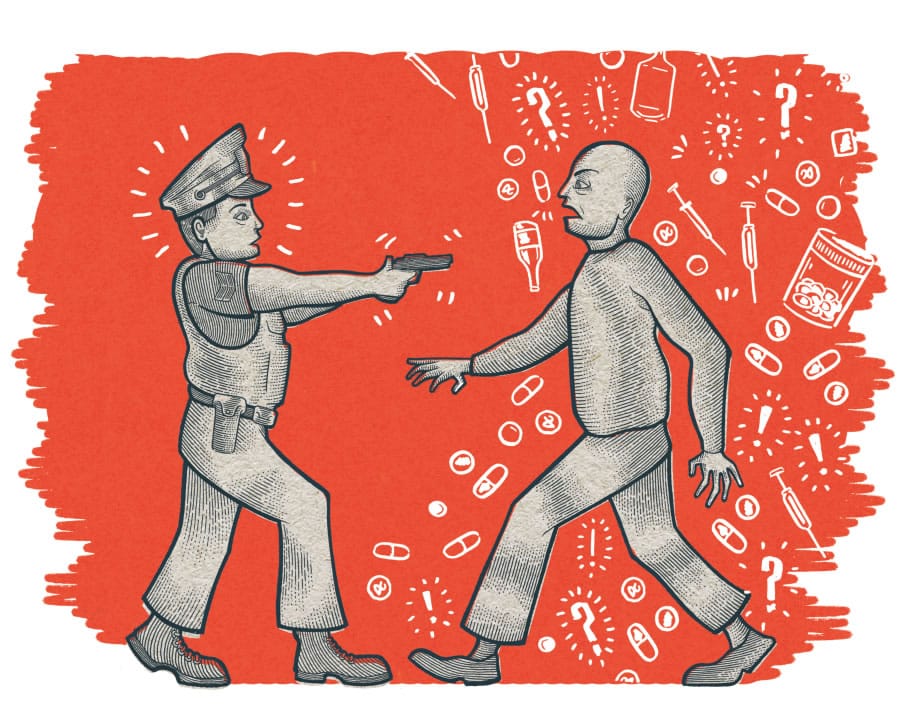When Vancouver police shot and killed Justin Andrew Burton after he barged into an occupied apartment in February and threatened the occupants with a knife, it was a violent end to an all-too-common crisis.
Months before, Burton was arrested on suspicion of criminal trespass and resisting arrest after trying to enter a closed bar, and the case was put on hold when the court determined he lacked the mental capacity to stand trial.
Burton was one of the roughly 5 percent of Americans who have a severe mental illness, according to the Substance Abuse and Mental Health Services Administration survey. Few of those people are ever violent, and contribute to maybe 3 to 5 percent of violent acts, according to the agency.
Yet people dealing with a mental illness make up at least a quarter of those shot and killed in police encounters, and even half by some estimates. That trend holds locally. In Clark County, where law enforcement officers have shot at least 24 people since 1997, 17 of which resulted in the death of the subject, according to official records and news archives.
Three recent incidents are still under investigation, but official reviews found police were justified in using deadly force in every other shooting.
In at least 14 of those encounters, court records and news clippings indicate the subject involved was somehow “in crisis” at the time of his death, or showed a history of problem drug use or mental illness.
Indeed, people exhibiting some kind of mental health issue — which officials and advocates often lump with drug abuse problems or mental and behavioral issues stemming from disability — come in contact with law enforcement officers at an outsize rate.
The National Sheriffs’ Association and Treatment Advocacy Center, in a joint report, estimated at least 16 percent of jail and prison inmates have some kind of mental illness, and other research from the latter organization estimated 10 percent of all law enforcement calls are generated by people with untreated, severe mental health problems.
In line with law
Recently, the Clark County Prosecutor’s Office found Vancouver police Officer Ed Letarte was justified and acted in line with the law firing at Burton. The report noted Burton was armed with a knife and cited officers’ concerns for their safety and the safety of those inside the apartment.
Burton’s history of mental health issues didn’t factor into the prosecutor’s office’s review of the February shooting, and his mental state at the time isn’t clear. The apartment’s tenants told The Columbian that Burton, whom they did not know, said little to nothing after barging into their home, and the prosecutor’s office review said there was little interaction between him and the responding officers before the shooting.
That’s part of the trouble, Vancouver police Lt. Kathy McNicholas said.
Cops can’t really diagnose whether someone they encounter out on the street is acting out due to a drug issue, mental illness or behavioral problem stemming from a disability, she said.
Likewise, since drug use and mental illness can be co-occurring, officers are trained to see these people as “in crisis,” she said.
“Officers can’t show up at a call and go, ‘Oh, you’re on meth and your wife just left you,’ or, ‘You lost your job and have alcohol,'” she said.
Law enforcement agencies have been trying to adapt by adopting crisis intervention training programs.
At the Vancouver Police Department, every officer has to go through a 40-hour crisis training program, she said, which includes working with treatment providers, negotiators, clinicians and people who have dealt with personal mental health problems.
The department is currently working on putting every officer through the training again.
“I think the officers are very wary, because our officers, truly they want to help people,” she said. “We want to make sure that person gets their needs met so we don’t deal with them again, and so they get better.”
Working with people in crisis has been a component of police work for a long time, but as drug rehab programs disappear with budget cuts and mental health treatment options dwindle, she added, it seems like the sheer numbers of those calls has risen.
“I think we’ve become social workers, and it’s just more and more put on police,” she said.
Lack of treatment options
Justin Burton’s story of apparent ineffective treatment and run-ins with the law mirrors others where people with mental problems died in encounters with police.
In a September incident, a bartender told police he was closing shop one day when he saw Burton peek in the windows. As he took out the trash, Burton sneaked up behind him.
The bartender told Burton the place was closed, but Burton continued to approach him with his chest out and fists clenched. The barkeep slipped inside, locked the door, then called the police.
When officers caught up with Burton in the parking lot, Burton remained nonverbal, paced back and forth and, at one point, raised his backpack in front of him and aggressively moved toward an officer, police said, leading to a struggle before his arrest.
According to district court records, a competency evaluation found Burton had received mental health and drug rehab services before, locally and at Western State Hospital, and had been diagnosed with paranoid schizophrenia, depression, schizoaffective disorder, post-traumatic stress disorder and amphetamine abuse.
The court determined he lacked the mental capacity to assist in his own defense. The case was placed on hold until he could receive treatment.
A lack of facilities
Better training for police and first responders doesn’t really get at one of the roots of the problem, Disability Rights Washington attorney Kim Mosolf said. The bigger problem is the contraction in mental health treatment services.
By one estimate, the number of public psychiatric hospital beds nationwide dropped from 340 beds per 100,000 people in the 1950s to 17 per 100,000 by 2005.
“If you’re not giving people appropriate treatment in their communities, I think what you’re going to see happen is they’re going to have more incidents with police,” Mosolf said. “They’re the mental health providers of last resort.”
The shortfall seems to be more acute in Washington. A 2016 assessment by Mental Health America, a mental health advocacy nonprofit, ranked Washington at 47th in terms of overall mental health after looking at access to care, substance abuse, the number of people with mental illnesses and other measures.
Last July, a judge held the state Department of Social and Health Services in contempt for not complying with an order to quickly provide competency evaluations for mentally ill defendants. Some defendants had been forced to wait weeks or months in jail before getting evaluations or treatment through Western State Hospital in Pierce County. That hospital also serves Clark County.
“I think you’re seeing, kind of, this snowball, that started way up on the hill and now, unfortunately, it’s at the bottom,” Mosolf said.
Disability Rights Washington, which a federally designated nonprofit watchdog that advocates on behalf of people with disabilities and mental illnesses, was among a host of advocacy and community groups that examined police use of force as part of a legislative task force last year.
A bill came out of that effort but faltered in the Legislature. It would have lowered the bar at which officers who use deadly force could be charged and would also have mandated additional de-escalation training for officers.
Mosolf said Disability Rights Washington and other groups, many associated with the original task force, are trying again with an initiative under the name De-Escalate Washington.
Improved training remains a key pillar of the effort, she said.
Addressing access to care and problems with stigma around mental health issues would be the ideal fix, but helping reduce the likelihood that police encounters with mentally ill people go wrong seems like the most viable course right now, Mosolf said.
“I think we have the unfortunate reality that we have failed people with the mental health treatment system in our state,” she said. “That’s our reality now. We have to make sure police officers have the resources and the training that police officers don’t respond in a way that escalates situations.”





